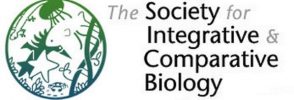Contents
Message from DAB Leadership
Avery Russell, Chair.DAB@sicb.org; Stephanie Campos, DPO.DAB@sicb.org; Allison Welch, Secretary.DAB@sicb.org; Conner Philson, Student/Postdoctoral Affairs Committee Representative
A huge thank you to all of the presenters, attendees, and volunteers who participated in SICB 2022 in Phoenix and in SICB+! We are grateful for everyone’s flexibility and resilience in navigating the in-person and virtual conference formats, particularly with the unprecedented amount of last-minute schedule changes necessitated by the omicron surge. One way or the other, we hope you were able to engage with colleagues and enjoy some excellent science.
An extra shout out to the many folks who engaged with DAB at SICB 2022 and SICB+ in the following ways:
- Student Mentoring Program participants, both students and mentors
- Best Student Presentation competition presenters, attendees, and judges
- DAB Members Meeting attendees
We value your engagement in DAB, and we warmly welcome all DAB members to participate in the future! If you are interested in other ways of getting involved in SICB/DAB, please reach out to a member of the DAB Executive Committee. If you have ideas to improve DAB, please let us know.
We look forward to seeing many more of you in person at SICB 2023 in Austin, Texas!
Best Student Presentation Competition
Thank you to everyone who participated in our 2022 Marlene Zuk and Elizabeth Adkins-Regan competitions, including students, judges, and attendees. Both competitions were conducted in a hybrid format this year, with students presenting in person, via SICB+, or both. This year’s competitions featured excellent student work in poster and oral presentations and live and virtual formats, as well as a high level of engagement across DAB with 42 students and 33 judges involved. Nine finalists presented in the Zuk Award special sessions (a live session in Phoenix and a SICB+ session), while the Adkins-Regan Award entrants presented in poster sessions throughout SICB and SICB+. Special thanks to the poster judges for their dedicated efforts despite myriad schedule changes. We are very proud of the quality of student research represented in the DAB Best Student Presentation competitions and of the commitment of the judges and other DAB members to supporting student development.
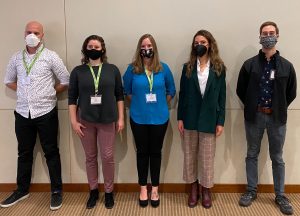
Zuk Award finalists in Phoenix: (left to right) John Anthony Jones, Olivia Harris, Elyse McMahon, Natalia Perez-Campanero, DAB Chair Avery Russell. (Finalists not pictured: Ananda Shikhara Bhat, Maëliss Hoarau, Keren Levy, Molly McDermott, Daniela Yardeny.)
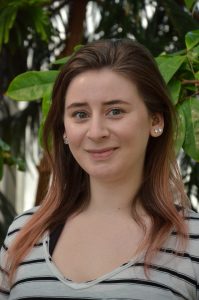
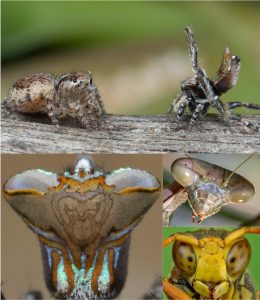
The Marlene Zuk Award for best oral presentation was awarded to Olivia Harris for her talk entitled “Exploitation of anti-predator behavior in the courtship displays of Maratus jumping spiders.” Olivia is a PhD candidate in the lab of Dr. Nate Morehouse at the University of Cincinnati. Her research focuses on the use of sensory exploitation and visual illusions in animal communication. Olivia’s dissertation work explores color perception and signaling ecology in jumping spiders, where she uses behavioral paradigms and machine learning to investigate the role of color in visual illusions. In the research she presented at SICB, Olivia used machine learning to demonstrate that male displays in some species of Maratus spiders can be mistaken for predators by the female visual system, supporting the hypothesis that these displays evolved to exploit female anti-predator responses.
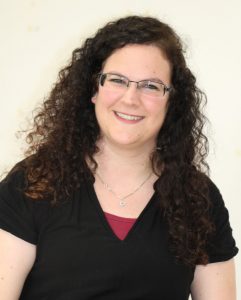
Honorable Mention in the Marlene Zuk oral presentation competition was awarded to Keren Levy for her talk, “Artificial Light at Night affects temporal synchronization in crickets.” Keren is a PhD student at Tel Aviv University and the Open University of Israel, where she investigates the effects of artificial light at night on cricket behavior. In her SICB presentation, Keren demonstrated that experimental exposure to artificial light at night disrupted the circadian activity patterns of male crickets and, as a consequence, reduced population-level synchronization of nocturnal and diurnal behaviors.

Sujay Balebail received the Elizabeth Adkins-Regan Award for his poster “Investigating the role of call periodicity and higher harmonic frequencies in mate attraction in the plainfin midshipman fish.” Sujay is a PhD candidate in the lab of Dr. Joseph Sisneros at the University of Washington. He is interested in the information content of animal signals, how signals propagate through the environment to reach intended recipients, and how recipients detect and interpret these signals. For his dissertation, Sujay is studying reproductive acoustic communication in the plainfin midshipman fish (Porichthys notatus). In his SICB poster, Sujay reported evidence for pitch perception in this species from acoustic trapping experiments in the field using signals with altered harmonic structure.
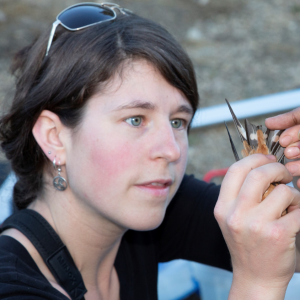
Finally, Molly McDermott received the Adrian M. Wenner Strong Inference Award for her talk “Physiological costs of reproduction: A field experiment in female Barn Swallows.” Molly is a PhD Candidate working in Dr. Rebecca Safran’s lab at the University of Colorado Boulder. For her PhD research, Molly tracks individual barn swallows to measure how nutrition and stress affect plumage traits and breeding performance. Molly is also a musician interested in communicating science through art. In the research she presented at SICB, Molly experimentally manipulated the costs of reproduction and self-maintenance and found that female barn swallows maintain investment in reproduction by trading off self-maintenance in the form of immune function.
Many congratulations to the awardees, kudos to all student presenters, and a big round of applause to all of the judges who helped evaluate and provide feedback for the student talk and poster presenters!
DAB Mentoring Program
The DAB Mentoring Program was organized again this year by Dr. Rindy Anderson and included 15 teams of mentors and students. The mentoring program was conducted virtually in order to maximize opportunities for participation. We are looking forward to an in-person version for 2023; please consider participating or reaching out to help organize. Thank you to Rindy and to the volunteer mentors for making this year’s program possible!
DAB Leadership Transitions
January 2022 marked the end of Dr. Kendra Stewart’s term as DAB Chair. For the past three years, Kendra has led DAB with wisdom, insight, and hard work. As Chair, Kendra has been a strong and consistent champion for DAB’s support for students and early career members, including instituting the DAB Mentoring Program. We are sincerely grateful to Kendra for her leadership and service.
Also in January, Dr. Kathleen Lynch stepped down as DAB Divisional Program Officer in order to assume a position as a program officer at NSF. Kathleen deserves special recognition for her work as a member of the SICB Program Committee over the past two years, with the huge effort involved with putting on SICB’s virtual meeting last year and both in-person SICB and SICB+ this year. Many thanks to Kathleen for her dedicated service to DAB during this time.
Dr. Stephanie Campos has joined the DAB Executive team this year, serving as interim Divisional Program Officer for DAB. Welcome, Stephanie!
Call for Symposia
Proposals for symposia for SICB 2024 in Seattle will be due in August. Please consider submitting a symposium proposal! DAB is interested in supporting symposia that highlight animal behavior in diverse animal systems and in co-sponsoring symposia that integrate animal behavior with complementary fields of research. Symposia that address diversity, equity, inclusion, and justice are highly encouraged. Organizing a symposium can be especially beneficial for early-career members, including postdocs and graduate students. Benefits include increasing the profile of a research topic and publication of symposium papers in Integrative and Comparative Biology (ICB). If you have an idea for a symposium topic or questions about organizing a symposium, please reach out to DAB’s program officer, Stephanie Campos (DPO.DAB@sicb.org), who can help you navigate the symposium proposal process.
SICB Election Now Open
Please vote in the Spring SICB Election. All SICB members, including students, are encouraged to vote. In addition to candidates for Society-wide positions, you will be able to vote on DAB Divisional Program Officer (DPO). More information about the DAB DPO candidates is below; the SICB-wide newsletter contains candidate biographies for Society-wide positions.
Students and Postdocs
SICB’s Student/Postdoctoral Affairs Committee (SPDAC) provides support and networking opportunities for students and postdocs across the society. If you have an idea for SPDAC or DAB, please reach out to DAB’s Student/Postdoctoral Affairs Committee Representative, Conner Philson: cphilson (at) ucla.edu. SPDAC is always looking for feedback on continuing programs and for new ideas!
Social Media
Please follow @SICB_DAB on twitter or join SICB Division of Animal Behavior on Facebook. Our twitter team, made up of Brett Hodinka, Matthew LeFauve, and Sarah Manka-Worthington, is working hard to boost our social media presence and bring SICB DAB content to your feed.
ABS 2022
The 2022 Animal Behavior Society (ABS) annual meeting will be July 20-23 and will be held in San Jose, Costa Rica as well as online. Abstract submissions were due May 1, and the program will be announced soon. ABS is DAB’s sibling organization, and SICB DAB is often well-represented there!
Candidates for Divisional Program Officer
Stephanie M. Campos
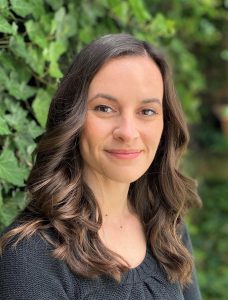
Current Position: Visiting Assistant Professor, Biology Department, Swarthmore College, Swarthmore, PA
Education: A.S. Dallas County Community College (2010); B.S. General Biology, University of Texas Arlington (2012); Ph.D. Evolution, Ecology, and Behavior, Indiana University (2018)
Professional Experience: NextGen Postdoctoral Fellow, Center for Behavioral Neuroscience, Georgia State University (2018-2020); Visiting Assistant Professor, Swarthmore College (2020-Present)
SICB Activities: Member since 2013; Interim Division Program Officer (DPO) for DAB (2022); Judge for DAB Best Student Presentation competitions; Symposium speaker (2021); Media promotion for symposium in collaboration with Charlotte Mangum Awardee (2020).
Other Memberships: Animal Behavior Society, Society for Behavioral Neuroendocrinology, International Society of Chemical Ecology
Research Interests: How do chemicals control the social lives of animals? I am interested in the impacts of chemical signals on territorial, competitive and reproductive behavior of lizards (Sceloporus and Anolis species). I ask about relationships between neuroendocrine signals (hormones and neurotransmitters) or exocrine signals (semiochemicals and glandular secretions) and behavior. I combine techniques from chemical and behavioral ecology, neuroethology, and evolutionary biology to test ethologically relevant hypotheses.
Goals Statement: I am grateful for the opportunity to serve as interim DPO for the Division of Animal Behavior this year and honored to be nominated to continue serving SICB in this capacity. SICB has played a formative role in my academic career since I presented at my first SICB in 2014. Since then, SICB has continued to shape my professional development. My husband even proposed to me after my 2020 talk at SICB in Austin, further demonstrating how intertwined SICB has become with major milestones in my life and career. Initially, I was attracted to SICB for its integrative and comparative nature, but I keep returning to the conference for its engaging community of open-minded individuals collectively working to nurture researchers at every stage of their careers. In addition, as a first-generation college graduate, I wish to serve a society with a history of fostering diversity, inclusion, and equitability. The Broadening Participation efforts by this society made it possible for me to experience this conference early in graduate school. If elected as DPO, I will advance these efforts by continuing to develop and improve the reach of such programs. I will work to boost representation by amplifying the voices of ethologists from diverse research groups. The symposia that DAB supports will allow fresh perspectives and new voices to rise to the surface. Thank you for your consideration.
Dara Orbach
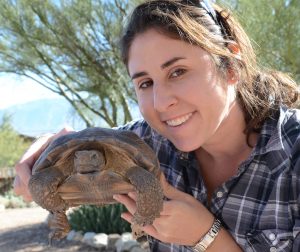
Current Position: Associate Professor, Texas A&M University-Corpus Christi, Corpus Christi, TX
Education: BS, University of British Columbia (2006); BA, University of British Columbia (2006); MS, University of Western Ontario (2009); PhD, Texas A&M University at Galveston (2016)
Professional Experience: Assistant Professor, Texas A&M University- Corpus Christi (2019-present); Visiting Assistant Professor, Mount Holyoke College (2016-2018); Postdoctoral Fellow, Dalhousie University (2016-2018)
SICB Activities: Society member (2016-present), DAB mentor (2019-2022), Judge for divisional Best Student Presentation competitions (2020-2022), Session chair (2020-2021), Symposium presenter (2022), Manuscript reviewer for Integrative and Comparative Biology, Teaching circle participant (2020-2021), Student volunteer (2016)
Other Memberships: Animal Behavior Society, Society for Marine Mammalogy, Texas Society of Mammalogists
Research Interests: Sexual selection, mating strategies; behavioral ecology; co-evolution of behavior and anatomy; reproductive morphology; functional morphology; copulatory biomechanics; sociobiology; decision-making processes; marine mammals
Statement of Goals: SICB has remained my favorite and primary conference since I joined the Society in 2016. I look forward annually to learning about interdisciplinary research that pushes boundaries, engaging presentations on innovative advances that can be widely applied across taxa, interacting with SICB’s supportive and student-centric community, and networking in a collegial and open environment. Each year’s meeting inspires me with novel ideas that I apply to my research or teaching. I am excited to be nominated for DAB’s Program Officer position and to serve SICB in a leadership capacity. I have extensive experience in conference organization, having served on the organization committee and volunteered at multiple conferences with thousands of attendees. I enjoy the logistics of developing a conference schedule with unified sessions where presenters experience a sense of belonging through shared research interests. SICB is a conference where cutting edge comparative research deemed ‘outside the box’ fits in and is well-received. I plan to continue the legacy of past Program Officers by ensuring that presentations are well-attended through careful selection of session themes. My goal is to broaden participation from underrepresented minorities and young researchers. I have supervised and mentored over 200 students from groups historically underrepresented in STEM disciplines, and I am committed to creating an inclusive environment. I also will aim to promote symposia submissions that stimulate intellectual growth and to create a synergistic milieu that provides opportunities for discussion and collaboration. I would be thrilled to serve as the Program Officer for DAB.
